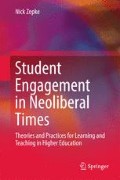Abstract
This chapter poses the key question of how critical student engagement might be imported into the neoliberal mainstream. It argues that a radical form of distributive leadership provides an answer. This form of leadership brings with it changes to pedagogy, curriculum and evaluation that involve all participants, including students as leaders in educational decision-making and so remove sole leadership from teachers and managers. Key principles of radical distributive leadership are discussed in relation to student engagement. The principles are then examined in the light of current practice in three case studies from New Zealand, the United Kingdom and the United States.
Access this chapter
Tax calculation will be finalised at checkout
Purchases are for personal use only
References
Arendt, H. (1958). The human condition. Chicago, Ill: Chicago University Press.
Bennett, N., Wise, C., Woods, P., & Harvey J. (2003). Distributed leadership. A review of the literature. Report for the National College for School Leadership, Nottingham.
Bovill, C. (2014). An investigation of co-created curricula within higher education in the UK, Ireland and the USA. Innovations in Education and Teaching International, 51(1), 15–25. doi:10.1080/14703297.2013.770264
Bovill, C., Morss, K., & Bulley, C. (2008). Curriculum design for the first year. First year enhancement theme report. Glasgow: QAA. http://www.enhancementthemes.ac.uk/docs/publications/the-first-year-experience-curriculum-design-for-the-first-year.pdf?sfvrsn=18. Accessed February 12, 2016
Burrell, G., & Morgan G. (1979). Sociological paradigms and organisational analysis. Aldershot, UK: Ashgate.
Carey, P. (2013). Student engagement in university decision-making: policies, processes and the student voice. Doctor of Philosophy Thesis, United Kingdom: Lancaster University.
Elon University. (2016). General Academic Regulations: 2015–2016 Academic Catalog. http://www.elon.edu/docs/e-web/academics/catalog/09academicregs10.pdf Accessed February 20, 2016
Engestrom, Y., Miettinen, R., & Punamaki, R. (1999). Perspectives on activity theory. Cambridge, UK: Cambridge University Press.
Fielding, M. (2004). Transformative approaches to student voice: Theoretical underpinnings, recalcitrant realities. British Educational Research Journal, 30(2), 295–311. http://www.jstor.org/stable/1502226
Foucault, M. (1981). The history of sexuality, Vol. 1. London, UK: Penguin.
Gronn, P. (2002). Distributed leadership. In K. Leithwood, P. Hallinger, K. Seashore-Louis, G. Furman-Brown, P. Gronn, W. Mulford & K. Riley (Eds.), Second handbook of educational leadership and administration (pp. 652–696). Dordrecht The Netherlands: Kluwer.
Habermas, J. (1987). Knowledge and human interests (J. Shapiro, Trans.). Oxford, UK: Polity Press.
Hartley, D. (2010). Paradigms: how far does research in distributed leadership ‘stretch’? Educational Management Administration & Leadership, 38(3). 271–285.
Leithwood K., Mascall B., & Strauss T. (2009). What we have learned and where we go from here. In K. Leithwood, B. Mascall & T. Strauss (Eds.), Distributed leadership according to the evidence (pp. 269–82). London, UK: Routledge.
Messick, S. (1989). Validity. In R. Linn (ed) Educational measurement (3rd Ed.). Washington, DC: American Council on Education.
Neary, M. (2013). Student as producer: A pedagogy for the avant-garde; or, how do revolutionary teachers teach? Retrieved from http://josswinn.org/wp-content/uploads/2013/12/15-72-1-pb-1.pdf. On October 11, 2014
Neary, M., Saunders, G., Hagyard, A., & Derricott, D. (2014). Student as producer: Research-engaged teaching, an institutional approach. Project Report. HEA. https://www.heacademy.ac.uk/sites/default/files/projects/lincoln_ntfs_2010_project_final_report_fv.pdf. Retrieved on February 12, 2016
Stake, R. (2000). Case study. In N. Denzin & Y. Lincoln (Eds.), Handbook of qualitative research, 2nd Edition (pp. 435–454). Thousand Oaks, CA: Sage.
Tian, M., Risku, M., & Collin, K. (2016). A meta-analysis of distributed leadership from 2002 to 2013: Theory development, empirical evidence and future research focus. Educational Management Administration & Leadership, 44(1), 146–164. doi:10.1177/1741143214558576
University of Lincoln. (2013). Academic policy summary sheet: Marking and grading policy. http://secretariat.blogs.lincoln.ac.uk/files/2013/08/Marking-and-Grading-Policy2.pdf. Retrieved February 18, 2016.
Viskovic, A. (2006) A history of a degree for tertiary teachers. Unpublished paper.
Wenger, E. (1998). Communities of practice: Learning, meaning and identity. Cambridge, UK: Cambridge University Press.
Woods, P., & Roberts, A. (2015). Distributed leadership and social justice: Images and meanings from across the school landscape. International Journal of Leadership in Education. doi:10.1080/13603124.2015.1034185
Author information
Authors and Affiliations
Corresponding author
Rights and permissions
Copyright information
© 2017 Springer Nature Singapore Pte Ltd.
About this chapter
Cite this chapter
Zepke, N. (2017). Through Distributive Leadership to Critical Engagement. In: Student Engagement in Neoliberal Times. Springer, Singapore. https://doi.org/10.1007/978-981-10-3200-4_11
Download citation
DOI: https://doi.org/10.1007/978-981-10-3200-4_11
Published:
Publisher Name: Springer, Singapore
Print ISBN: 978-981-10-3198-4
Online ISBN: 978-981-10-3200-4
eBook Packages: EducationEducation (R0)

